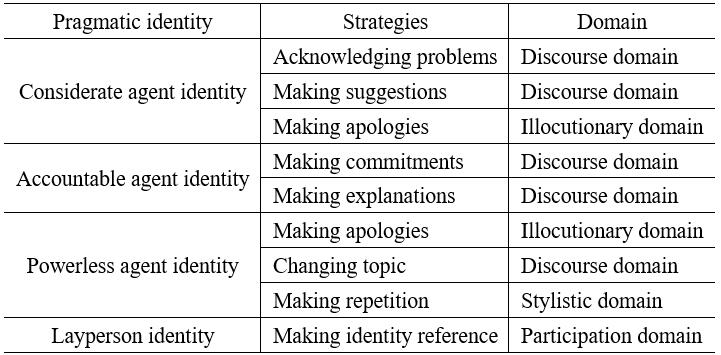A Study of Customer Service Agent’s Pragmatic Identity Construction in Complaint Responses
Abstract
Positioned within rapport management theory proposed by Spencer-Oatey, this article investigates the customer service agent’s pragmatic identity construction in complaint response calls. Drawing on data of 42 complaint handling recordings from the customer care center of a Chinese airline company, this study tries to address these three research questions: 1) What types of pragmatic identities do the customer service agents construct in complaint response calls? 2) How are these pragmatic identities constructed through rapport management strategies? 3) What interpersonal functions do these pragmatic identities perform? By adopting a qualitative research method, this study has found that the agents mainly construct three default identities and one deviational identity in complaint response calls by employing nine rapport management strategies from four rapport management domains. These different pragmatic identities mainly perform three kinds of interpersonal functions: support face needs, support sociality rights and obligations, and support interactional goals. The findings further validates the feasibility of rapport management theory in the study of identity construction, and provides new ideas for future study on pragmatic identity construction in institutional communications.
Downloads
References
Antaki, C., & Widdicombe, S. (1998). Identity as an achievement and as a tool. London: Sage Publications.
Benwell, B., & Stokoe, E. (2006). Discourse and Identity. Edinburgh: Edinburgh University Press.
Brown, G., & Yule. (1983). Discourse Analysis. Cambridge: Cambridge University Press. https://doi.org/10.1017/CBO9780511805226
Brown, P., & Levinson, S. C. (1987). Politeness: Some Universals in Language Usage. Cambridge: Cambridge University Press. https://doi.org/10.1017/CBO9780511813085
Bucholtz, M., & Hall, K. (2005). Identity and interaction: A socio-cultural linguistic approach. Discourse Study, 7(4-5), 585-641. https://doi.org/10.1177/1461445605054407
Chen, Xinren. (2009). The Social Psychological Dimension of Pragmatics. Foreign Languages in China, 6(05), 46-52.
Chen, Xinren. (2013). Pragmatic Identity: Dynamic Choice and Discourse Construction. Foreign Languages Research, 140(4), 27-32.
Chen, Xinren. (2014). The Study of Identity from the Perspective of Pragmatics: Key Issues and Main Approaches. Modern Foreign Languages, 37(05), 702-710.
Chen, Xinren. (2018). A Critical Pragmatic Analysis of “Identity Pattern” in Commercial Advertisements. Shandong Foreign Language Teaching, 39(05), 24-33.
Chen, Xinren & Li, Mengxin. (2016). Identity Conflicts and Discourse Strategies in Academic Context: Based on the Analysis of Moderators’ Discourse at Academic Conferences. Foreign Languages Research, 33(02):16-22.
Davidow, M. (2003). Organizational responses to customer complaint: what works and what doesn’t. Journal of Service Research, 5(3), 225-250. https://doi.org/10.1177/1094670502238917
Davies, C. E. (2019). An autoethnographic approach to understanding identity construction through the enactment of sense of humor as embodied practice. Journal of Pragmatics, 152, 200-215. https://doi.org/10.1016/j.pragma.2019.02.010
Doga, I. (2017). Complaint handling on social media: The impact of multiple response times on consumer satisfaction. Computers in Human Behavior, 74, 72-78. https://doi.org/10.1016/j.chb.2017.04.016
Drew, P., & Walker, T. (2009). Going too far: complaining, escalating and disaffiliation. Journal of Pragmatics, 41, 2400-2414. https://doi.org/10.1016/j.pragma.2008.09.046
Ekström, M., & Lundström, F. (2014). The termination of complaints in calls to an authority for student support. Journal of Pragmatics, 74, 132-149. https://doi.org/10.1016/j.pragma.2014.09.006
Feng & Ren. (2019). “This is the destiny, darling”: Relational acts in Chinese management responses to online consumer reviews. Discourse, Context & Media, 28, 52-59. https://doi.org/10.1016/j.dcm.2018.09.003
Guo, Yadong. (2016). Research on Identity Construction of Female Scholars in Academic Discourse. Foreign Languages Research, 33(02):29-32+38.
Ho, V. (2017). Giving offense and making amends: How hotel management attempts to manage rapport with dissatisfied customers. Journal of Pragmatics, 109, 1-11. https://doi.org/10.1016/j.pragma.2016.12.001
Ho, V. (2018). Exploring the effectiveness of hotel management's responses to negative online comments. Lingua, 216, 47-63. https://doi.org/10.1016/j.lingua.2018.10.004
Hutzinger, C. & Weitzl, W, Z. (2019). Co-creation of online service recoveries and its effects on complaint bystanders. Journal of Business Research. https://doi.org/10.1016/j.jbusres.2019.10.022
Karatepe, O. M. (2006). Customer complaints and organizational responses: the effects of complainants’ perceptions of justice on satisfaction and loyalty. International Journal of Hospitality Management, 25(1), 69-90. https://doi.org/10.1016/j.ijhm.2004.12.008
Kevoe-Feldman, H. (2018). The interactional work of suppressing complaints in customer service encounters. Journal of Pragmatics, 123, 102-112. https://doi.org/10.1016/j.pragma.2017.10.018
Li, Chengtuan & Ran, Yongping. (2015). Study on Identity Construction within Interpersonal Pragmatics: Its Present State, Theoretical Principles and New Directions. Foreign Languages in China, 12(2), 47-54.
Li, Juan. (2016). Research on Acknowledgements in Doctoral Dissertation from the Perspective of Pragmatic Identity. Foreign Languages Research, 33(02), 33-38.
Li, Ying, & Deng, Liming. (2019). I am what I have written: A case study of identity construction in and through personal statement writing. Journal of English for Academic Purposes, 37, 70-87. https://doi.org/10.1016/j.jeap.2018.11.005
Liao, T, H & Keng, C, J. (2013). Online shopping delivery delay: Finding a psychological recovery strategy by online consumer experiences. Computers in Human Behavior, 29(04), 1849-1861. https://doi.org/10.1016/j.chb.2013.03.004
Marquez-Reiter, R. (2013). The dynamics of complaining in a Latin American for-profit commercial setting. Journal of Pragmatics, 57, 231-247. https://doi.org/10.1016/j.pragma.2013.08.024
Marx & Engels. (1997). Selected Works of Marx and Engels (vol.1). Beijing: People's Publishing House.
Melancon, J, P., & Dalakas, V. (2018). Consumer social voice in the age of social media: Segmentation profiles and relationship marketing strategies. Business Horizons, 61(01), 157-167. https://doi.org/10.1016/j.bushor.2017.09.015
Min, H., Joireman, J., & Kim, H, J. (2019). Understanding why anger predicts intention to complain among high but not low power customers: A test of competing models. Journal of Business Research, 95, 93-102. https://doi.org/10.1016/j.jbusres.2018.10.017
Orthaber, S. (2019). Aggressive humour as a means of voicing customer dissatisfaction and creating in-group identity. Journal of Pragmatics, 152, 160-171. https://doi.org/10.1016/j.pragma.2018.11.002
Orthaber, S., & Márquez-Reiter, R. (2011). “Talk to the hand”. Complaints to a public transport company. Journal of Pragmatics, 43(15), 3860-3876. https://doi.org/10.1016/j.pragma.2011.10.004
Ran, Yongping. (2007). An in-depth Study of the Traditional Topics of Pragmatics and Expansion of Emerging Topics---a Review of the 10th International Symposium on Pragmatics. Foreign Language Education, (06), 6-10.
Ran, Yongping. (2012). Managing and Violating Rappoort in Interpersonal Communication. Foreign Language Education, 33(04), 1-5.
Refiana, L. (2012). Qualitative Analysis about Consumer Complaint Response through Reader's Letter Column in Kompas.com. Procedia-Social and Behavioral Sciences, 65, 83-87. https://doi.org/10.1016/j.sbspro.2012.11.095
Ren, Yuxin. (2012). Constructing Identities in Academic Advising Interaction: An Adaptationist Account. Nanjing University: Unpublished doctoral dissertation.
Sierra, S. (2019). Linguistic and ethnic media stereotypes in everyday talk: Humor and identity construction among friends. Journal of Pragmatics, 152, 186-199. https://doi.org/10.1016/j.pragma.2018.09.007
Simon, B. (2004). Identity in Modern Society: A Social Psychological Perspective. Oxford: Blackwell. https://doi.org/10.1002/9780470773437
Spencer-Oatey, H. (2008). Culturally Speaking: Culture, Communication and Politeness Theory. London :Continuum International Publishing Group.
Stryker, S. (1987). Identity theory: developments and extensions. In K. Yardley & T.Honess (Eds.), Self and Identity: Psychosocial Perspectives (pp. 89-103). New York: Wiley.
Sun, Li. (2015). Study on Pragmatic Identity Construction in English Abstract of Chinese Master's Thesis. Foreign Languages and Their Teaching, (05), 15-21.
Tajfel, H. (1978). Social categorization, social identity, and social comparisons. In Tajfel (Ed.), Differentiation between social groups (pp.61-76). Waltham: Academic Press.
Tracy, K., & Robles, J. S. (2002). Everyday Talk: Building and Reflecting Identities New York: Guilford Press.
Vöge, M. (2010). Local identity processes in business meetings displayed through laughter in complaint sequences. Journal of Pragmatics, 42(06), 1556-1576. https://doi.org/10.1016/j.pragma.2010.01.016
Yuan, Zhoumin. (2011). An empirical study on pragmatic identity construction of medical consultants from the perspective of adaptation theory. Nanjing university: Unpublished doctoral dissertation.
Yuan, Zhoumin. (2013). On Dynamics of Consultants’ Identity Construction in Business Phone-in. Language Teaching and Linguistic Studies, (06):89-96.
Zhang, Haiyang. (2006). Chinese multiculturalism and Chinese identity. Beijing: Ethnic press.
Zhang & Vásquez, C. (2014). Hotels’ responses to online reviews: Managing consumer dissatisfaction. Discourse, Context & Media, 6, 54-64. https://doi.org/10.1016/j.dcm.2014.08.004
Zhong, Jiabao. (2018). Study on Pragmatic Identity Construction of Graduate Students in Academic English in the New Era. Foreign Languages in China, 15(05), 62-66.


This work is licensed under a Creative Commons Attribution 4.0 International License.
Copyright for this article is retained by the author(s), with first publication rights granted to the journal.
This is an open-access article distributed under the terms and conditions of the Creative Commons Attribution license (http://creativecommons.org/licenses/by/4.0/).









1.png)









1.png)











